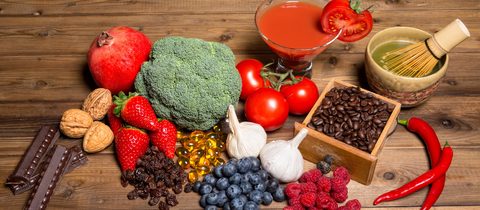How to Effectively Reduce Inflammation
Eat Those Antioxidants
Eating a diet rich in antioxidant- and polyphenol packed foods can help reverse and protect one from inflammation by reducing “free-radical damage.” Free radicals are generated by the body when it’s in a state of stress.
Antioxidants and polyphenols are great for protecting us from most all illness and disease including boosting the immune system. To add these powerful nutrients, drink green or black tea and eating a rainbow of veggies, some low-sugar fruits such as berries or kiwi. Examples of what veggies to reach for: broccoli, or cauliflower, kale, all leafy greens, collards, sweet potatoes, berries. Spices are powerful such as Turmeric, garlic, cinnamon, cayenne pepper and ginger have all been shown in studies to have anti-inflammatory properties. You can’t overdo these, so sprinkle them liberally onto or into your food.
Consume Essential Fats
Getting a good ratio of omega-6 and omega-3 fatty acids in your diet is important for reducing inflammation. Most of us consume too much omega-6 and not enough omega-3, so the key to balancing things is to increase omega-3 intake. Omega-6-heavy foods like seeds and nuts and their oils, and refined vegetable oils (used in many snack foods, crackers, cookies, etc.), tend to stir up inflammation, while foods high in omega-3 fatty acids like salmon, flax and chia seeds, avocado and walnuts dampen it.
Spice It Up
Turmeric, garlic, cinnamon, cayenne pepper, rosemary and ginger have all been shown in studies to have anti-inflammatory properties. You can’t overdo these, so sprinkle them liberally onto your food, add rosemary to your cooking oil to prevent oxidation, add to tea, smoothies, soups, stews and any foods.
Use The Ketogenic Diet
The Ketogenic Diet, a very low-carbohydrate, high-fat way of eating has been shown to be very effective in promoting health benefits throughout the body including reversing inflammation. When the keto diet is compared with a low fat diet, research shows that the low-carb diet has a more favorable impact.
Eating a diet with less than 50 grams of carbohydrates daily can be challenging for some. However, if consistent, this elimination of carbohydrates and the increase in healthy fat produces ketones such as beta hydroxyl butyrate, which inhibits or blocks the dysregulated NLRP3 inflammasome activation.
Add CBD
One such simple action step we can take for many health conditions including inflammation, is utilizing the powerful benefits of CBD.
CBD is a compound extracted from the hemp plant. It is one of more than 100 unique compounds found in hemp, known as cannabinoids. Hemp is a plant that is grown for a wide variety of uses and is part of the cannabis plant. Hemp-derived CBD contains less than 0.3% THC, it does not give you a high, and is drug-free – why it is set apart from marijuana. In fact, CBD can actually counteract the effect of THC.
Research is showing that cannabidiol or CBD may be beneficial in treating pain and inflammation. This is great news for many people suffer from the pain of inflammation each and every day.
Research has found that the anti-inflammatory properties may help with general pain, inflammatory conditions, cardiovascular disease, IBS, multiple sclerosis, cancer, and Alzheimer’s disease. Many people are living a life pain-free due to CBD’s benefits.
Move Your Body
Moving around releases a burst of anti-inflammatory proteins such as cytokines from the cells to the rest of the body. Exercise also helps to flush bacteria out of the lungs and airways along with the increase of infection-fighting white blood cells. However, moderate exercise is key as excess exercise is inflammatory. An example of moderate exercise is 45 minutes of cardio, such as fast walking or jogging, about three – four times a week. Just one 20 minute session can act as an anti-inflammatory.
Stress
Cortisol, often referred to as the “stress” hormone, has many functions, including regulating the immune response. Reducing stress helps to keep hormones like cortisol under control and that, in turn, helps lower inflammation. Excess cortisol from chronic stress has a powerful inflammatory effect. Cortisl helps the body to store visceral fat – that fat around the belly that produces more inflammatory molecules than white adipose fat tissue such as in our thighs. Routinely practicing deep breathing, meditation, massage, yoga and other applications helps to keep cortisol and its negative effects in check.
Sleep
Lack of sleep unfortunately promotes inflammation and reduced immune response leaving us vulnerable to infection, illness and weight gain… while more sleep has the opposite effect. A review of several studies found that sleeping less than eight hours a night was linked to weight gain. Quality sleep strengthens your immune system, helps optimize fat loss and promotes optimal brain health, better mood and slower aging.





